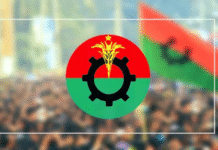Pakistan’s national assembly, through a reassertion of the myopia which has historically kept Pakistan captive to its prejudices and inhibitions, has passed a resolution condemning the execution of Abdul Quader Mollah, a notorious war criminal in occupied Bangladesh in 1971. The country’s interior minister, Chaudhry Nisar Ali Khan, has glibly called the hanging a ‘judicial murder’. The assembly unsurprisingly and carefully ignored the fact that Mollah and others like him had helped the Pakistan army in the murder of three million Bengalis and the rape of two hundred thousand Bengali women.
The move in the national assembly is once again a sign of Pakistan’s inability to forget the humiliation it went through in Bangladesh in December 1971. Because it cannot forget, it remains attitudinally bitter towards Bengalis.
Activists and supporters of Jamaat-e-Islami Pakistan have been staging noisy demonstrations in various cities and towns of the country to protest the execution of Abdul Quader Mollah in Bangladesh. Mollah, a notorious collaborator of the Pakistan occupation forces in Bangladesh in 1971, has been described as shaheed-e-Pakistan (martyr of Pakistan). These protesters have carried posters inscribed with the question, in Urdu, “Bangladesh mein Jamaat-e-Islami mujrim kyun” (why is the Jamaat-e-Islami a convict in Bangladesh?).
Leading figures in the Pakistani Jamaat have demanded that their government sever diplomatic relations with Bangladesh as a way of registering its outrage over the hanging of Mollah. As if in response to this demand, Chaudhry Nisar Ali Khan, minister for interior in Pakistan’s federal cabinet, earlier came forth with expressions of his “deep grief” over Mollah’s hanging. Khan has minced no words in suggesting that the Bangladesh Jamaat politician was hanged because of his solidarity with Pakistan during Bangladesh’s Liberation War in 1971. “Till the very end before the creation of Bangladesh”, as the Pakistani minister has put it, Mollah remained a supporter of a united Pakistan, which is why “today every Pakistani is saddened”‘.
That said, Jamaat leaders in Pakistan have drawn attention to an alleged deal reached by Bangabandhu Sheikh Mujibur Rahman and Zulfikar Ali Bhutto to the effect that no one would die or be punished in Bangladesh over his role during 1971 and after. The statement is a lie.
For its part, the Pakistan foreign ministry, on its website, records its concern that the war crimes trials in Bangladesh have “added to the current instability” in the country. The ministry nevertheless wishes the “brotherly people of Bangladesh” well.
All these factors, coming from Pakistan in light of Mollah’s execution, highlight yet once again the state of denial that has been at work in the Pakistani establishment since the Pakistan army surrendered in Dhaka on 16 December 1971.
The state of denial began soon after ZA Bhutto took over as president and chief martial law administrator from a discredited Yahya Khan in late December 1971. At his very first meeting with Bangabandhu in Rawalpindi after having the latter moved from solitary confinement to house arrest, Bhutto informed Bangladesh’s founder that the Indian army was in occupation of “East Pakistan”. In the years leading up to Islamabad’s recognition of Dhaka’s independence, Pakistan persisted in referring to Bangladesh as the “Dhaka authorities”.
Pakistan was compelled to accord recognition to Bangladesh prior to the Islamic conference, held in Lahore, in February 1974. Later that year, in response to an appeal from Abdul Haq, a pro-Beijing communist leader in Bangladesh, for aid to overthrow the government of Bangabandhu Sheikh Mujibur Rahman, Bhutto instructed his cabinet to help Haq. Reference on the subject can be traced to Stanley Wolpert’s “Zulfi Bhutto of Pakistan”.
During his visit to Dhaka in June 1974, a clearly reluctant and angry Bhutto was compelled to visit the National Memorial at Savar to honour Bangladesh’s freedom fighters. His behaviour bordered on the insulting. He refused to doff the Mao cap he had on; and when the visitors’ book was presented before him for his comments, he lashed out, “Enough of this nonsense”, before pushing the book aside.
Pakistanis cheered the assassination of Bangabandhu on 15 August 1975. Prime minister Bhutto, carried away by the “good news”, quickly recognised the “Islamic Republic” of Bangladesh when no such change had come despite the coup and ordered sacks of rice to be sent to the “brotherly” people of Bangladesh.
In his time, General Ziaul Haq, Pakistan’s third military ruler, laid a wreath at the Savar memorial during his visit to Bangladesh in 1985. When Bangladesh’s media people asked him about his feelings on the occasion, he gave them a rather glib and confusing reply, “Your freedom fighters are our freedom fighters”.
In all the years since December 1971, no Pakistani government has expressed any apologies or remorse over the atrocities carried out by the Pakistan army in Bangladesh. Pervez Musharraf, the country’s fourth military ruler, once expressed no more than “regret” at what had transpired in 1971.
Under the tripartite agreement reached by Bangladesh, India and Pakistan in Delhi in April 1974, all Bangalees stranded in Pakistan were to return home to Bangladesh, which they did. All Pakistani prisoners of war in camps across India were to go back to their country, which they did. As for the 195 Pakistani military officers Bangladesh wanted to try for war crimes, the Bhutto government, aware of the backlash it could face from Pakistanis, promised the Bangladesh government that if the officers were freed, they would be tried in Pakistan itself. The 195 went back home, but Pakistan’s promise about trying them was never kept.
Today, against the background of the Pakistani interior minister’s comments on the Mollah execution and the national assembly resolution and in light of the “concerns” expressed on the Pakistani foreign office website, the silence of the Bangladesh government, especially the foreign office, is deeply mystifying, indeed stupefying. No protest has been made to the Pakistan authorities. The Pakistani high commissioner in Dhaka has not been summoned to the foreign office for an explanation.
The Pakistani Jamaat’s diatribe against Bangladesh may be understandable. But when it is a Pakistani minister and Pakistan’s foreign policy establishment taking issue over Mollah’s execution, there is no question that the move is a blatant and therefore unacceptable interference in the internal affairs of a country now engaged in meting out justice to the perpetrators of the genocide that left three million Bangalees dead.
Will Foreign Minister AH Mahmood Ali enlighten the nation on his silence?
Will the foreign office explain why it has chosen to ignore Pakistan’s behaviour on the war crimes issue?
Source: The Daily Star










It is veer significant that the three secular parties in the Pakistan Parliament, the ANP, the PPP and the MQM did not support the Resolution. Secular-minded parties in Bangladesh should strengthen bonds with these elements in Pakistan. We have a common fight against Fundamentalism in the body politic.
.
Dear Mr. Zulfi,
Because, those leaders in Pakistan Parliament are never been brave enough to speak the truth. Only young generation of Pakistan could bring the country in to correct path where there shall not be a single criminal from JAMAT………